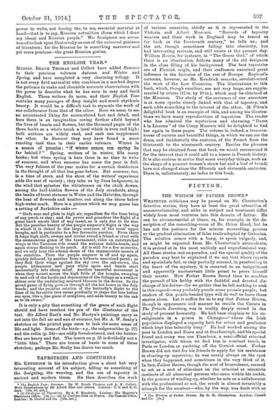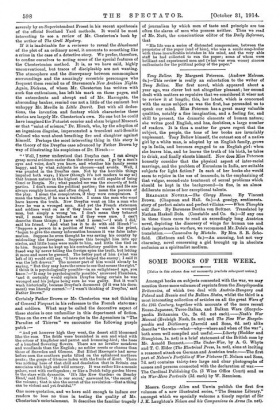FICTION.
JAM WISDOM OF FAIL:tilt BROWN.* WHATEVER criticisms may be passed on Mr. Chesterton's detective stories, they have at least the great attraction of unconventionality, and alike in subject and treatment differ widely from most ventures into this domain of fiction. He can be circumstantial at times, as, for example, in the de- scription of the consulting-room of Dr. Orion Hood, but he has not the patience for the minute unravelling process or the gradual elimination of false trails adopted by Gaboriau. The solution comes with a bang, to speak vulgarly, and, as might be expected from Mr. Chesterton's antecedents, it is arrived at in the most unlikely and unprofessional way. All these stories rest on paradox, and the special quality of the paradox may best be explained if we say that where experts and specialists fail, or only partially succeed, in penetrating to the heart of the mystery, it is reserved to an insignificant and apparently unobservant little priest to prove himself their master. How Father Brown found time to combine the pursuit of his hobby with the faithful and devoted dis- charge of his duties—for we gather that he left nothing to seek in this regard—may probably puzzle some prosaic .people; but readers of this puzzle-headed type will do well to leave these stories alone. Let it suffice for us to say that Father Brown, though in appearance and manner he recalls the Curate in The Private Secretary, was in reality deeply versed in the study of peccant humanity. He had been chaplain to his co. religionists in a prison in Chicago—" where the Irish population displayed a capacity both for crime and penitence which kept him tolerably busy." He had worked among the poor in London and Essex and at Scarborough, and his special friend and crony was one Flambeau, a semi-official criminal investigator, with whom we find him in constant touch, in Paris or London or yachting off the Cornish coast. Father Brown did not wait for hie friends to apply for his assistance in clearing up mysteries; he was nearly always on the spot when they happened, and sometimes in the very thick of it. In fact, Father Brown, though the soul of benevolence, seemed to act as a sort of stimulant on the criminal or eccentrics instincts of all abnormal persons who came within his ambit. In the process of winding-up, whether he acts as a collaborator with the professional or not, the result is almost invariably a triumph for the amateur—who, by the way, was dealt with so • Th. Wisdom of Father Brown. By G. H. Chesterton. London: Cassell and Co. [Si.)
severely by ex-Superintendent Froest in his recent apotheosis of the official Scotland Yard methods. It would be most interesting to see a review of Mr. Chesterton'e book by the author of The Grell Mystery.
If it is inadvisable for a reviewer to reveal the dernoliment of the plot of an ordinary novel, it amounts to something like a crime in the case of a detective story. We prefer, therefore, to confine ourselves to noting some of the special features of the Chestertonian method. It is, as we have said, highly unconventional, but traces of discipleship are not wanting. The atmosphere and the discrepancy between commonplace surroundings and the amazingly eccentric personages who frequent them remind us of Stevenson's New Arabian Nights. Again, Dickens, of whom Mr. Chesterton has written with such fine enthusiasm, has left his mark on these pages, and the antecedents and abrupt end of Mr. Harrogate, the absconding banker, remind one not a little of the eminent but unhappy Mr. Merdle in Little Dorrit. But with all deduc- tions, the invention and fantasy which characterize these stories are largely Mr. Chesterton's own. No one but he could have imagined the Futurist courier and sham brigand Muscari, or that "saint of science," Dr. Hirsch, who, by the adoption of an ingenious disguise, impersonated a truculent anti-Semitic Colonel who went about breathing fire and slaughter against himself. Perhaps the most interesting thing in this story is the theory of the Dreyfus case advanced by Father Brown by way of illustrating his suspicions of Dr. Hirsch :—
" Well, I never understood that Dreyfus case. I can always grasp moral evidence easier than the other sorts. I go by a man's eyes and voice, don't you know, and whether his family seems happy, and by what subjects he chooses—and avoids. Well, I was puzzled in the Dreyfus case. Not by the horrible things imputed both ways; I know (though it's not modern to say so) that human nature in the highest places is still capable of being Cenci or Borgia. No; what puzzled me was the sincerity of both parties. I don't mean the political parties ; the rank and file are always roughly honest, and often duped. I mean the persons of the play. I mean the conspirators, if they were conspirators. I mean the traitor, if he was a traitor. I mean the men who must have known the truth. Now Dreyfus went on like a man who knew he was a wronged man. And yet the French statesmen and soldiers went on as if they knew he wasn't a wronged man, but simply a wrong 'un. I don't mean they behaved well, I mean they behaved as if they were sure. I can't describe these things; I know what I mean.'—' I wish I did,' said his friend. 'And what has it to do with old Hirsch ?'— 'Suppose a person in a position of trust,' went on the priest, 'began to give the enemy information because it was false infor- mation. Suppose he even thought he was saving his country by misleading the foreigner. Suppose this brought him into spy circles, and little loans were made to him, and little ties tied on to him. Suppose he kept up his contradictory position in a con- fused way by never telling the foreign spies the truth, but letting it more and more be guessed. The better part of him (what was left of it) would still say, "I have not helped the enemy ; I said it was the loft drawer." The meaner part of him would already be saying, "But they may have the sense to see that means the right." I think it is psychologically possible—in an enlightened age, you know.'—'It may be psychologically possible,' answered Flambeau, 'and it certainly would explain Dreyfus being certain he was wronged and his judges being sure be was guilty. But it won't wash historically, because Dreyfus's document (if it was his docu- ment) was literally correct.'—' I wasn't thinking of Dreyfus,' said Father Brown."
Certainly Father Brown or Mr. Chesterton was not thinking of General Picquart in his reference to the French statesmel and soldiers. What may be called the decorative aspect of these stories is one unfamiliar in this department of fiction. Thus on the eve of the catastrophe in the Apennines in "The Paradise of Thieves" we encounter the following purple patch :—
"And yet however high they went, the desert still blossomed like the rose. The fields were burnished in sun and wind with the colour of kingfisher and parrot and humming-bird ; the hues of a hundred flowering flowers. There are no lovelier meadows and woodlands than the English; no nobler crests or chasms than those of Snowdon and Glencoe. But Ethel Harrogate had never before seen the southern parks tilted on the splintered northern peaks ; the gorge of Glencoe laden with the fruits of Kent. There was nothing here of that chill and desolation that in Britain one associates with high and wild scenery. It was rather like a mosaic palace, rent with earthquakes; or like a Dutch tulip garden blown to the stars with dynamite. 'It's like Kew Gardens on Beachy Head,' said Ethel. It is our secret,' answered he, the secret of the volcano; that is also the secret of the revolution—that a thing can be violent and yet fruitful."
One more quotation, and we have said enough to induce our readers to lose no time in testing the quality of Mr. Chestertoia's entertainment, It describes the familiar tragedy of journalism by which men of taste and principle are too often the slaves of men who possess neither. Thus we read of Mr. Nutt, the conscientious editor of the Daily Reformer, that
"His life was a series of distracted compromises, between the proprietor of the paper (and of him), who was a senile soap-boiler with three ineradicable mistakes in his mind, and the very able staff he had collected to run the paper; some of whom were brilliant and experienced men and (what was even worse) sincere enthusiasts for the political policy of the paper."



































 Previous page
Previous page